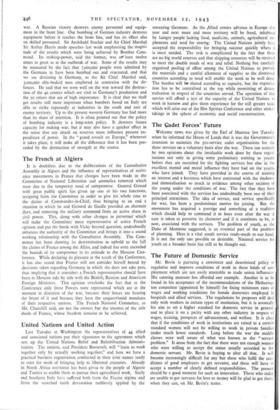The Future of Domestic Service
Mr. Bevin is pursuing a consistent and determined policy to regularise and improve conditions of work in those kinds of em- ployment which are not easily amenable to trade union influences. His catering measure has afforded one example. Another is to be found in his acceptance of the recommendations of the Hethering- ton committee (appointed by himself) for fixing minimum rates of wages and working conditions for female domestics employed in hospitals and allied services. The regulations he proposes will deal only with workers in certain types of institution, but it is avowedly his aim to set a higher standard for domestic service in general, and to place it on a parity with any other industry in respect of wages, training, prospects of advancement, and welfare. It is clear that if the conditions of work in institutions are raised to a certain standard women will not be willing to work in private families under much lower standards. Long before the war the middle classes were well aware of what was known as the " servant problem." It arose from the fact that there were not enough women who were willing to accept the status usually accorded to the domestic servant. Mr. Bevin is hoping to alter all that. It will become increasingly difficult for any but those who fulfil the con- ditions of good employers to get servants, and these will have to accept a number of clearly defined responsibilities. The present should be a good moment for such an innovation. Those who today are unable to get servants for love or money will be glad to get them, when they can, on Mr. Bevin's terms.


























 Previous page
Previous page